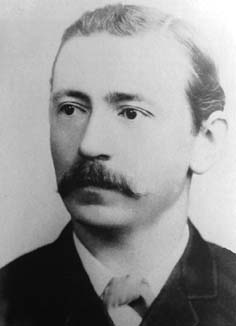Andrew Forsyth facts for kids
Quick facts for kids
Andrew Russell Forsyth
|
|
|---|---|

Andrew Forsyth (1890)
|
|
| Born | 18 June 1858 Glasgow, Scotland
|
| Died | 2 June 1942 South Kensington, England
|
| Alma mater | Trinity College, Cambridge |
| Awards | Royal Medal (1897) |
| Scientific career | |
| Fields | Mathematics |
| Institutions | University of Liverpool Trinity College, Cambridge |
| Academic advisors | Arthur Cayley |
| Notable students | Edmund Taylor Whittaker |
Andrew Russell Forsyth was a brilliant British mathematician. He was born in Glasgow, Scotland, on June 18, 1858. He made important contributions to mathematics, especially through his many books. He passed away on June 2, 1942, in South Kensington, England.
Contents
Life of a Mathematician
Andrew Forsyth was born in Glasgow on June 18, 1858. His father, John Forsyth, was a marine engineer. Andrew showed great promise in his studies from a young age.
Early Education and Career
Forsyth studied at Liverpool College. He then went to Trinity College, Cambridge. In 1881, he graduated as a "senior wrangler." This meant he was the top mathematics student in his year.
After college, he became a fellow at Trinity. At just 24 years old, he was appointed a professor of mathematics. This was at the University of Liverpool.
Return to Cambridge
In 1884, Forsyth returned to Cambridge as a lecturer. He became the Sadleirian Professor of Pure Mathematics in 1895. This was a very important position.
In 1910, he resigned from his role due to personal reasons. Later that year, he married Marion Amelia Pollock.
Later Career and Achievements
In 1913, Forsyth became a professor at the Imperial College of Science. He retired in 1923 but kept working on mathematics. He was active well into his seventies.
He was recognized for his work in many ways. In 1886, he was elected a Fellow of the Royal Society (FRS). This is a very high honor for scientists. He also won the Royal Medal in 1897. This award is given for important scientific discoveries.
Forsyth was a speaker at the International Congress of Mathematicians in Rome in 1908. He is best known for writing many mathematics textbooks. One of his students was E. T. Whittaker, who also became a famous mathematician.
Forsyth passed away in London on June 2, 1942. He received an honorary degree from the University of Oslo in 1902. This was to celebrate the 100th birthday of the mathematician Niels Henrik Abel.
Family Life
Andrew Forsyth married Marion Amelia Pollock in 1910.
Important Works
Andrew Forsyth wrote many influential books on mathematics. Here are some of his key works:
- A Treatise on Differential Equations (1885)
- Theory of Functions of a Complex Variable (1893)
- Geodesics on an oblate spheroid (1895–96)
- Theory of Differential Equations (1890–1906) – a six-volume series
- Lectures on the Differential Geometry of Curves and Surfaces (1912)
- Lectures Introductory to the Theory of Functions of Two Complex Variables (1914)
- Solutions of the Examples in a Treatise on Differential Equations (1918)
- Calculus of Variations (1927)
- Geometry of Four Dimensions (1930)
- Intrinsic Geometry of Ideal Space (1935) vol. 1 vol. 2
See Also
- Laguerre–Forsyth invariant
Images for kids
 | William L. Dawson |
 | W. E. B. Du Bois |
 | Harry Belafonte |


